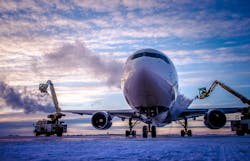MSP Takes on Winter
Minnesota’s winters in recent years have proven challenging, and busy, for airport ground support staff, says Mark Rudolph, manager of the Field Maintenance Department at Minneapolis-St. Paul International Airport (MSP).
To honor and recognize this airport team’s tremendous efforts in winter weather, they were awarded the Balchen/Post Award for the 2018-19 winter season. The award was presented at the American Association of Airport Executives’ International Aviation Snow Symposium in New York this past spring.
“For our team, this is like winning the Stanley Cup,” says Rudolph of the 160 people who are called out during ice and snow events at MSP. He says the management team and on-the-ground staff worked proactively and collaboratively to respond to the 30 snow and ice control call-outs last year, a number which is becoming more common after the last few seasons.
“In February alone, we had some personnel without a day off the entire month,” he adds. “Their dedication is a sacrifice. When people get to go home or have holidays with family, they are coming into work.”
Ready for the Ride
The “Polar Coaster,” as meteorologists are calling it, is expected to bring frigid temps and above average snow/ice again this winter. To prepare for the unknown, MSP trains year-round and then ramps up meetings and weather/equipment-specific trainings in the fall.
Winter operations’ meetings involve all tenants and necessary employees – a time to help them learn about winter operations at MSP, as well as procedures and equipment which may be new from the previous season. Communications then extend to pre-snow event conference calls, which airlines are invited to participate in, as well as post-event critiques, to evaluate response efforts.
Personnel efforts are just one part of the prep work before the winter season hits. Rudolph says reliable, quality equipment is a must as well. This year, his department has upped its pavement deicing abilities with additional sprayers to pretreat runways with potassium acetate. The timing with this is critical, as he explains, they don’t want to apply it and have the chemical wash off before it can bond to the pavement.
“We’re basically standing by with those deicers watching surface temperature readings from the runways that our managers see live,” he says. “When the temperature is just right, we can apply that chemical. What we do is scientific, because we have to factor in winds, temperatures, etc.”
Lessons Along the Way
Rudolph came to MSP in 1999, and says that in his 20 years, he’s learned, first and foremost, to listen to his employees, and encourages all airport managers to do the same.
“You need to listen to your boots-on-the-ground, so to speak,” Rudolph explains. “Take their input, watch their behaviors, because once they’re called out, they don’t go home until a snow event is over.”
Then, he offers as advice, that the efforts around pre-planning cannot be underestimated.
“Pre-planning is huge with all of our stakeholders,” Rudolph adds. “We need to have everyone on the same page, not only the field maintenance department, but the air traffic control tower, our tenants. Everybody has to be on the same page to make this work.”
After listening and planning, winter operations’ staff must be flexible.
“Things change,” he says. “This is a dynamic environment. Sometimes we have to scratch the first plan and go to Plan B.”
Rising to a Super Challenge
As Super Bowl LII host in 2018, Minneapolis had its hands full with a big snow event the same week, right before thousands of football fans headed through MSP.
“People were tired,” says Rudolph. “I was just so impressed that our team management and on-the-field staff came together to represent the state of Minnesota and MSP.”
A snowy January and February led up to a lot of extra hours working overtime to make sure planes flew, but employee morale remained high during the Super Bowl travel peak hours.
Rudolph says they didn’t quite know what they were getting into, and planned for the worst, but everything proved to work for the best and provide an amazing experience for both the staff and the entire airport community.
“It’s really a team,” he emphasizes about winter operations. “Nobody here says ‘I did this or that.’”
Rudolph says when the weather gets tough, he remembers something a colleague told him once: “’I look up in the terminal windows and think of that little boy or girl sitting there watching us move snow so they can get to their destination – somewhere warm.’ It’s cool when your employees recognize that.”
Sun Country Thrives in Winter
R. Brian Davis, vice president of ground operations for Sun Country Airlines says that it’s rare for them to cancel a flight due to snow.
“We have an industry-leading 99.8% completion factor,” Davis says. “However, safety is our number one priority in our decisions.”
He says that aircraft deicing procedures are very well defined, and the airline follows strict FAA guidelines, at all times. They own their own deicing trucks but use a third-party ground support provider for labor. While Davis explains Sun Country doesn’t have a no-cancellation policy, its four deicing trucks and weather monitoring help make decisions and can deice four aircraft in an hour.
Davis explains there is an additional cost for deicing to maintain the company’s flight completion rate, but it’s well worth the investment.
“Especially being based in Minnesota,” he adds. “Our operation is uniquely poised to operate throughout the toughest of winter weather.”
Rising to meet Minnesota’s harsh winter weather hasn’t always been easy, but Davis says his team’s greatest accomplishment came last year during the polar vortex, which hit this Midwest airport.
“Because of our preparedness in cold-weather situations we were able to move forward and not cancel any flights on this day,” he notes. “We have hired employees and management that are well-versed in cold-weather operations and believe we have one of the very best teams in the industry.”
About the Author

Jen Bradley
Jen Bradley, owner of Bradley Bylines, is an aviation writer based in East Troy, WI. She may be reached via her website at www.bradleybylines.com.
